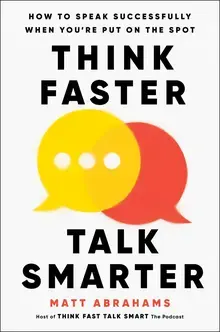Structure
Information:
Below is an overview of content that matches the tag "structure".
Note that this list is not exhaustive, as it is automatically aggregated based on manually assigned categorizations.
If you notice a missing element, or think some of the items are wrongfully categorized, please create a bug/improvement ticket on our github issue tracker.
An overview of all tags used in this publication can be found in our tag list: go to overview
Books tagged with "Structure"
bibliographical reference:
Abrahams, M. (2023) Think Faster, Talk Smarter. S&S/Simon Element. isbn: 978-1668010303.
Abrahams, M. (2023) Think Faster, Talk Smarter. S&S/Simon Element. isbn: 978-1668010303.
description:
Think Faster, Talk Smarter tackles the anxiety of answering on the spot during meetings, interviews, and presentations. Matt Abrahams blends improv exercises, message maps, and rehearsal techniques so speakers can organise thoughts quickly without freezing. The guidance is approachable for anyone who wants clearer, more confident spontaneous communication—not just formal presenters.
